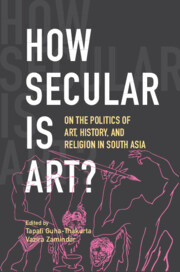6 - Modern Art and East Pakistan: Drawing from the Limits
Published online by Cambridge University Press: 21 February 2023
Summary
Looking from East Pakistan
Questions of art and secularism raised in this volume are seeking a South Asian scale, possibly with resonant histories or historiographical possibilities across the subcontinent’s unstable twentieth-century borders. Invited to write on Bangladesh—a critical yet often-marginal perspective in such conversations—my quandaries were two: Are such questions around art and the secular posed to or drawn from the particular histories of the subcontinent’s (relatively young) nation-states? And along that drift, what analytical, even unsettling work, can such particular histories do, in the imagination of such questions aiming subcontinental scales?
My concerns in this essay are historiographical. Not in the sense of re/configuring multiple positions on questions of art and the secular in Bangladesh, but looking from the region and its particularity, as a methodology of perceiving the secular in its plural form(ation)s, as we attempt to generate truly subcontinental art histories. Such looking from location, I am hoping, can release Bangladesh—former East Pakistan, 1947–1971—from being merely an indexical marker for representing South Asia (beyond the hegemonic centre that Indian art/histories have held in the region), and become rather an analytical vantage point to re/generate subcontinental questions. The locational, I will argue, is neither a (simply) spatial nor a rhetorical marker; it is both temporal and epistemological; and as such an agent of the historical itself. While the locational tends to be subsumed within the nation (particularly so in conversations on postcolonial modernities and artistic modernisms), it sustains a critical traffic with transnational and transregional currents (or the often-used scale of the ‘global’), which needs more critical attention in South Asian art/historiography.
As a vantage point, Bangladesh is both a young nation-state of fifty years and the vestige of the long decolonization in South Asia. In this essay, I am positioning myself in East Pakistan: that brief political entity between two climactic partitions in the subcontinent—India’s in 1947 with the creation of Pakistan, and Pakistan’s in 1971 with the liberation of Bangladesh. East Pakistan was formed from the partition of the Bengal province of British India in 1947, on grounds of religion, as a new Muslim-majority Pakistan emerged alongside independent India with the eclipse of British Empire in the subcontinent.
- Type
- Chapter
- Information
- How Secular Is Art?On the Politics of Art, History and Religion in South Asia, pp. 157 - 188Publisher: Cambridge University PressPrint publication year: 2024



